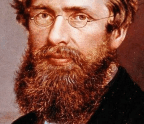
Matt Elton: What do we know about the first encounters between the west and Asia?
Christopher Harding: If we head back to, say, the fifth century BC, there was nothing at all known about China or Japan – it was really only India that people in the west had any knowledge of. The Persian empire – which at this point stretched from the Greek-speaking world all the way to north-west India – was an incredibly important conduit for information between the ‘west’ (using that phrase quite loosely) and India.
We think maybe the first known westerner to go to India would have been an explorer called Scylax of Caryanda. In the fifth century BC he was asked by the Persian emperor to sail down the Indus river, basically to see where it went. He left what's potentially the first ever account for westerners of India: a series of reports that, although we've lost them in their entirety, still survive in fragments. They set the tone for the early centuries of western interest by picturing it as a place of fabulous strangeness and fabulous wealth: people with one leg ending in an enormous foot, for instance, enabling them to lie back at noon and use it as a kind of umbrella to shade themselves. As you can imagine, this garnered enormous western interest.
One of the people associated with this early story is Alexander the Great. What do we know about his role in exploring Asia?
In the fourth century BC, his armies made it all the way into north-west India. Precisely what happened next is hard to know for sure, because there was so much romanticising about what he did. At that point people believed that India was the furthest east you could go before you




